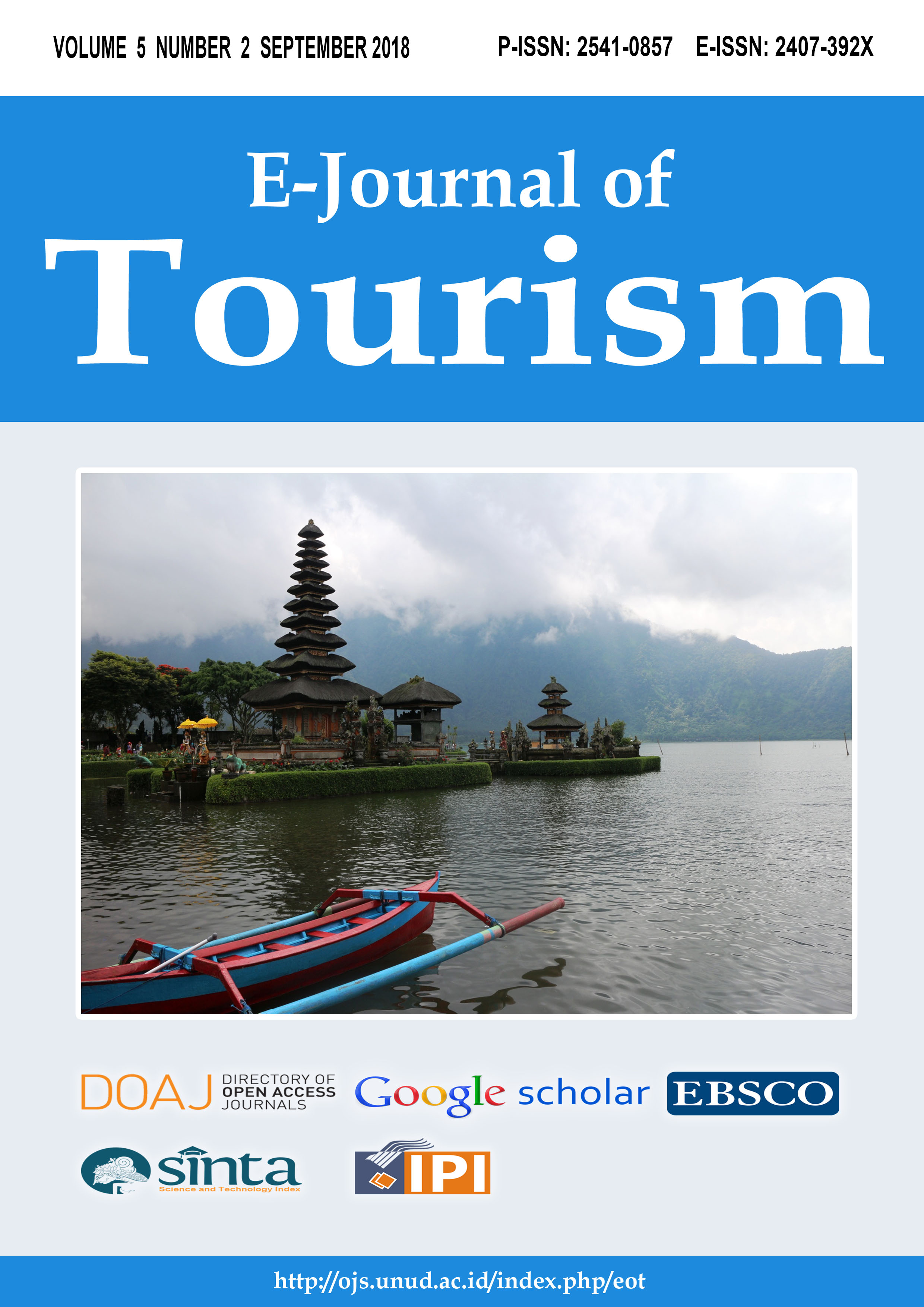The Relationship Among Community Based Tourism Application, Community Attitude, Community Empowerment and Community Life Satisfaction
Abstract
Tourism involves the movement of individuals from one region to another, which are sometimes of different cultures. The interaction between tourists and local communities in tourist destinations is social interaction. The community does not always react positively to the development of certain destinations or attractions. Public attitudes that are not always beneficial to tourism have various causes, such as the well-being differences that appear so starkly between wealthy tourists and poor local communities and conflict over limited resources such as water, land and cultural resources. This condition needs to be addressed because frequent demonstrations at various tourist attractions in Bali may jeopardize the security and comfort of tourists and affect the image of Bali as an international tourist destination. This study aims to: 1) To evaluate local government policies in community empowerment; 2) To measure perceived community-based tourism implemented in the destination areas 3) To measure thelife satisfaction of the people in tourist destinations; 3)To measure individual attitude toward toursm develoment in Destinations. The results of this study are expected to be useful as input in the formulation of regional tourism policies to realize tourism development goals effectively. This study is different from previous tourism studies because it examines the impact of tourism development from an integral perspective of sustainable tourism and community-based tourism.
Keywords: community attitude, community-based tourism, community empowerment, community life satisfaction.
Downloads
References
Blackstock, K. (2005) ‘A critical look at community based tourism’, Community development journal. Oxford University Press, 40(1), pp. 39–49.
Butler, R. W. (1999) ‘Sustainable tourism: A state‐of‐the‐art review’, Tourism geographies. Taylor & Francis, 1(1), pp. 7–25.
Castañeda, Q. (2012) ‘The neoliberal imperative of tourism: Rights and legitimization in the Unwto global code of ethics for tourism’, Practicing Anthropology. JSTOR, 34(3), pp. 47–51.
Cole, S. (2006) ‘Information and empowerment: The keys to achieving sustainable tourism’, Journal of sustainable tourism. Taylor & Francis, 14(6), pp. 629–644.
Dwyer, L., Forsyth, P. and Spurr, R. (2003) ‘Inter-industry effects of tourism growth: implications for destination managers’, Tourism Economics. SAGE Publications Sage UK: London, England, 9(2), pp. 117–132.
Ghosh, S. (2011) ‘Examining tourism-led growth hypothesis for India’, International Journal of Indian Culture and Business Management. Inderscience Publishers, 4(3), pp. 347–355.
Goodwin, H. and Santilli, R. (2009) ‘Community-based tourism: A success’, ICRT Occasional paper. International Centre for Responsible Tourism, Leeds Metropolitan University, 11(1), p. 37.
Gössling, S. (2002) ‘Global Environmental Consequences of Tourism’, Global environmental change, 12(4), pp. 283–302.
Harrison, D. and Schipani, S. (2007) ‘Lao tourism and poverty alleviation: Community-based tourism and the private sector’, Current issues in tourism. Taylor & Francis, 10(2–3), pp. 194–230.
Hughey, K. F. D., Kerr, G. N. and Cullen, R. (2010) Public perceptions of New Zealand’s environment: 2010. EOS Ecology.
Hunter, C. (1997) ‘Sustainable tourism as an adaptive paradigm’, Annals of tourism research. Elsevier, 24(4), pp. 850–867.
Irandu, E. M. (2004) ‘The role of tourism in the conservation of cultural heritage in Kenya’, Asia Pacific journal of tourism research. Taylor & Francis, 9(2), pp. 133–150.
Kang, S.-M. et al. (2003) ‘Culture-specific patterns in the prediction of life satisfaction: Roles of emotion, relationship quality, and self-esteem’, Personality and Social Psychology Bulletin. Sage Publications, 29(12), pp. 1596–1608.
Kim, K., Uysal, M. and Sirgy, M. J. (2013) ‘How does tourism in a community impact the quality of life of community residents?’, Tourism Management. Elsevier, 36, pp. 527–540.
Lepp, A. (2007) ‘Residents’ attitudes towards tourism in Bigodi village, Uganda’, Tourism management. Elsevier, 28(3), pp. 876–885.
Lim, C. and McAleer, M. (2005) ‘Ecologically sustainable tourism management’, Environmental Modelling & Software. Elsevier, 20(11), pp. 1431–1438.
Liu, B., Liu, Z. and Towsley, D. (2003) ‘On the capacity of hybrid wireless networks’, in INFOCOM 2003. Twenty-Second Annual Joint Conference of the IEEE Computer and Communications. IEEE Societies. IEEE, pp. 1543–1552.
Mansperger, M. C. (1995) ‘Tourism and cultural change in small-scale societies’, Human Organization. JSTOR, pp. 87–94.
Mbagwu, F. et al. (2016) ‘Youths Involvement in Self-Help Community Development Projects (SHCDPs) in Nsukka, Enugu State, Nigeria’. Canadian Center of Science and Education.
Murphy, P. E. (2013) Tourism: A community approach (RLE Tourism). Routledge.
Neto, F. (2003) ‘A new approach to sustainable tourism development: Moving beyond environmental protection’, in Natural resources forum. Wiley Online Library, pp. 212–222.
Nunkoo, R. and Ramkissoon, H. (2011) ‘Developing a community support model for tourism’, Annals of Tourism Research. Elsevier, 38(3), pp. 964–988.
Peters, M. (1969) International tourism: The economics and development of the international tourist trade. Hutchinson London.
Petri, P. and Plummer, M. (2016) ‘The economic effects of the Trans-Pacific Partnership: New estimates’.
Presenza, A. and Cipollina, M. (2010) ‘Analysing tourism stakeholders networks’, Tourism Review. Emerald Group Publishing Limited, 65(4), pp. 17–30.
Simpson, M. C. (2008) ‘Community benefit tourism initiatives—A conceptual oxymoron?’, Tourism management. Elsevier, 29(1), pp. 1–18.
Sunlu, U. (2003) ‘Environmental impacts of tourism’, in Conference on the Relationships between Global Trades and Local Resources in the Mediterranean Region, pp. 263–270.
Teye, V., Sirakaya, E. and Sönmez, S. F. (2002) ‘Residents’ Attitudes Toward Tourism Development’, Annals of tourism research, 29(3), pp. 668–688.
Tosun, C. (2000) ‘Limits to community participation in the tourism development process in developing countries’, Tourism management. Elsevier, 21(6), pp. 613–633.

This work is licensed under a Creative Commons Attribution 4.0 International License.
The copyright of the received article shall be assigned to the journal as the publisher of the journal. The intended copyright includes the right to publish the article in various forms (including reprints). The journal maintains the publishing rights to the published articles.




















